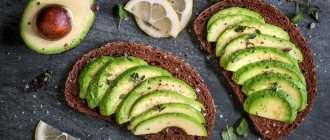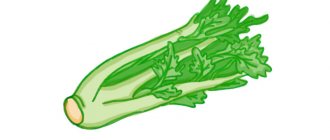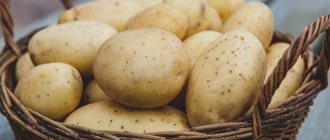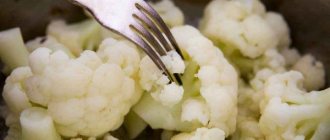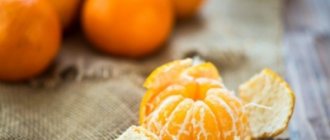Before giving birth, many young mothers are already beginning to wonder what to eat during lactation. After all, nutrition during breastfeeding completely affects the baby’s body. What foods can you eat, which ones should you limit, and which ones should you not eat at all?
Bananas are often called a controversial product during breastfeeding. Although these fruits are hypoallergenic, they can still upset a newborn’s stool and cause constipation. Let's take a closer look at whether bananas can be consumed while breastfeeding, and if so, how and in what quantity.
Banana: fruit or berry
The word “banana” translated from Latin means “fruit of the wise man.” They grow only in hot countries, since the fruits take an average of 4 months to ripen, and even in the south of Russia, summer will not be enough for them. The plant itself is a grass, and its bundles are berries.
Bananas delight us with the presence of many vitamins and beneficial minerals. In addition, they are rich in pectin, fiber and help our body produce serotonin - the hormone of happiness.
The ancient Egyptians grew bananas and even shared tips on growing this herb with their descendants. And in India it is believed that the serpent tempted Adam and Eve with a banana, not an apple.
Table: content of nutrients in bananas
Beneficial features
Eating bananas has a positive effect on human health; it is not for nothing that the ancient Egyptians considered this berry medicinal. The vitamins and minerals included in its composition determine the effect on the human body:
- vitamin A is good for bones and teeth, eyes, hair and skin, and the immune system;
- B vitamins, which are never found in foods alone, are indispensable for proper metabolism and muscle function, the condition of the nervous and digestive systems, skin, hair and liver. Bananas are especially rich in vitamin B6, which is involved in the processing of amino acids and the absorption of proteins, necessary for proper digestion and water metabolism in the body, the functioning of the immune system, maintaining visual acuity and cardiac activity;
- Vitamin C supports the stability of the nervous system, helps fight stress, improves mood and sleep, and is responsible for healthy gums, beautiful hair, and visual acuity.
- potassium is good for the heart, lowers blood pressure, alleviates allergic reactions, improves oxygen supply to the brain;
- magnesium is necessary for relaxing muscles and the entire nervous system, participates in the formation of DNA, prevents the appearance of cell mutations, regulates the amount of calcium in the body;
- manganese is important for bone formation, improving digestion, and reducing cholesterol levels in the body. He struggles with poor memory and nervous irritation.
Bananas are removed from the plant while they are still green, which makes them easier to transport.
The benefits of bananas for a nursing mother
Breastfeeding mothers can undoubtedly benefit from eating bananas. For example, potassium, which is very important during pregnancy, does not lose its relevance for women during lactation, as it supports heart function and fluid balance in the body.
The recommended amount of potassium per day is 2500 mg, while one banana contains about 450 mg. Thus, to get the daily intake of the substance, a nursing woman needs to eat 5-6 fruits. But you shouldn’t be like monkeys, because the mineral is also found in other foods, the main thing is variety.
For those who are breastfeeding, a banana is a real godsend, because it contains “slow” carbohydrates that are absorbed by the body for a long time and, like batteries, support the mother during sleepless nights and fun daytime games with the baby. In this regard, the exotic fruit is a good substitute for sweets, saves you from sudden mood swings, and you don’t even need to cook it!
Banana satisfies hunger well and saturates the body with energy.
Bananas contain tryptophan, which is good for the heart and blood vessels, helps to survive premenstrual syndrome, normalizes sleep and relieves signs of fatigue, that is, it allows you to look great, despite numerous worries about the baby. Moreover, this substance is involved in the production of serotonin, the hormone of happiness, which is so necessary for postpartum depression.
When can a nursing mother eat bananas?
Doctors have different opinions regarding the introduction of bananas into the diet of a nursing mother. On the one hand, it’s hard to argue with the benefits of these fruits; they are classified as hypoallergenic, but on the other hand, it’s hard to predict a child’s reaction to such a product. This tasty delicacy is exotic for our country, but is available almost all year round and is very popular. Therefore, you have to decide, focusing on your own body.
Only 0.1–1.2% of the world's population is allergic to bananas.
If you enjoyed eating bananas during pregnancy, and there were no cases of allergies among your family, you can try them after giving birth. If you are more conservative and rarely consumed this fruit before, wait at least one month. Perhaps the ideal option for the child would be to introduce bananas into the mother’s diet after three months, when the baby’s immature digestive system is ready to digest more diverse substances.
Bananas should be consumed in moderation during breastfeeding.
To properly introduce banana into your diet while breastfeeding, you must follow the following recommendations:
- eat only one new product at a time, observe the reaction for at least two days;
- start with small doses in the morning (it is advisable to take just a small bite of banana on the first day). If no allergic reactions occur after the first time, eat a quarter of the fruit every other day, gradually increasing the volume. Thus, in a week you can eat the whole fruit;
- if, as a result of the appearance of a product on the mother’s menu, rashes occur on the baby’s skin or problems with stool, it is necessary to postpone its use for at least a month;
- if you introduce banana in the first weeks of breastfeeding, it is better to limit yourself to one fruit every three days;
- if you introduce banana after three months of lactation, try to eat no more than 2-3 pieces per day.
Bananas during breastfeeding: strengthen or weaken
Bananas, depending on the degree of ripeness, can have different effects on the human intestines. This is due to the content of pectin in it, which is able to absorb liquid and thus remove harmful substances from the body. In a ripe product its content is quite high to have a laxative effect, but in unripe fruit it is reduced, so the banana strengthens. Unripe berries can lead to increased gas formation and colic in the mother and her baby due to excess starch content.
Of course, it is not always possible to choose the perfect product in the store, so it is better to take a slightly green banana and let it ripen at home. It is recommended to store fruits at room temperature, since overheating or cooling them inhibits the ripening process.
Video: how to choose bananas
Possible harm to baby and mother
However, do not forget that each organism is individual, and any product can cause rejection. Sometimes when eating bananas, the baby develops an allergic reaction, constipation or diarrhea, as well as colic. As for a nursing mother, you should be careful if:
- you have even a slight allergy or intolerance to bananas;
- you have problems with blood vessels, since the berry promotes blood thickening if consumed in excess;
- you are worried about excess weight, in which case it is better to eat them in the morning;
- you have diabetes, because ripe bananas increase blood glucose levels;
- You didn't eat bananas during pregnancy. Both your body and the child’s body may react negatively to its administration.
You should choose bananas very carefully, because they affect the stool of both mother and baby. Before eating, fruits must be washed.
Can bananas be harmful during lactation?
Can I eat bananas while breastfeeding? In fact, opinions regarding this issue are sometimes divided. Despite the huge amount of vitamins in the fruit, the following disadvantages can be identified in its use:
- Sometimes bananas can cause allergies in children, but this is extremely rare and simply goes away with age.
- If a mother has problems with blood vessels, then she is not recommended to eat bananas because the blood thickens even more.
- Eating bananas in the evening can lead to a woman gaining extra pounds, because the fruit contains a sufficient amount of sugar.
- Some bananas may contain harmful substances, so it is very important to know how to choose the right fruit.
We can conclude that you can eat bananas while breastfeeding, but you need to do this carefully and know how to choose the right fruit.
Are dried and baked bananas good for breastfeeding?
Bananas are widely used in cooking in the preparation of salads, various desserts, and cocktails. All this is possible for nursing mothers if they have already introduced the product into their diet.
Shops also offer dried bananas. It is worth noting here that the calorie content of the product increases more than four times, and in the case of banana chips, almost six times. And if the production of dried fruits does not require chemical processing, then banana chips are unlikely to boast of this. During thermal exposure, some beneficial vitamins and minerals are lost, and the use of palm or coconut oil also adds substances harmful to the body.
Shops offer you dried bananas
As for baked berries, in addition to deteriorating the quality of the fibers, the lion's share of ascorbic acid and B vitamins contained in the fresh product is lost during heat treatment. Therefore, no dried, fried or baked bananas or banana chips can compare in terms of benefits for the body with fresh ripe fruits. Of course, their use during breastfeeding is possible, but the question arises about the benefits of such nutrition not only for the baby, but also for the mother herself.
In what form to use
After childbirth, it is better to eat bananas fresh, but you can also eat dried fruits.
It is not forbidden to add fruits to desserts, fruit salads (other ingredients are usually apples, citruses, and the dressing is sour cream), oatmeal or rice porridge, milkshakes based on low-fat yogurt. A mixture of low-fat cottage cheese, banana, and cookies baked in the oven perfectly satisfies hunger.
Video: living healthy - about the benefits of banana
Bananas are designed to provide mothers with excellent mood and energy, and babies with full development. To get the most out of this product, remember to follow the directions, use moderation and be patient as your child's digestive system needs to mature before it can be digested.
- Author: Anastasia Mironchuk
Rate this article:
(0 votes, average: 0 out of 5)
Any woman who has given birth during lactation carefully monitors her diet, especially in the first months of the child’s life. Many mothers notice how their appetite increases at this moment, this is due to fatigue, sleepless nights and calories that go away along with breast milk. And in addition to healthy food, a nursing mother really wants something tasty, and often bananas become such a delicacy. There is an opinion that these sweet fruits are the least allergic and most beneficial for a woman and her baby. However, it’s worth figuring out whether a nursing mother can have bananas? How much benefit do they have, and how much harm to the health of the newborn or his mother?
Beneficial features
Banana is one of the most common fruits around the world, used not only in its raw form, but also as an ingredient in many dishes. In the countries where these fruits grow, they eat both the pulp and the peel, and even the leaves of the trees. There are a huge number of varieties, from tasteless types that go into processing to sugary ones, from small fruits to large ones.
Large sweet fruits are common in our country. So we’ll talk about them, is it possible for a woman to eat these fruits while breastfeeding, and what benefits or harm do they bring to the baby’s body?
Useful properties of the product, the pulp contains:
- a large amount of minerals such as potassium, magnesium, which help strengthen the heart muscle and prevent cardiovascular diseases;
- almost all B vitamins, which have a beneficial effect on the brain, concentration and memory improvement;
- vitamin E, which improves the condition of skin and hair;
- vitamin C, which strengthens the immune system;
- iron, if this fruit is consumed regularly, then a nursing mother can increase hemoglobin;
- tryptophan - this amino acid helps regulate digestion and appetite, normalizes sleep; if you eat a banana at least once a day, a woman will quickly get into the rhythm of her new life, and this is so important in the first month after childbirth;
- serotonin is the famous hormone of joy, it is especially important for eliminating postpartum depression in young mothers;
- a large amount of fiber helps a woman during breastfeeding to get rid of constipation and restore the usual digestive process.
Bananas during breastfeeding are safe for allergic babies; according to many pediatricians, infants rarely experience reactions such as itching or allergic skin rashes to this product.
However, before consuming this fruit, mother needs to remember that the fruits are exotic and individual intolerance to the product is possible.
The nuances of including a child in the menu
Is it possible for an infant to eat a banana? We will consider it in detail below. This overseas fruit is included in the menu when breastfeeding a child, subject to the following conditions:
- absence of disorders in the child’s digestive tract;
- using the fetus for food while carrying a baby;
- absence of rash, redness in children during breastfeeding.
At what age is complementary feeding allowed?
Reference.
Pediatricians suggest adding fruit complementary foods after 8-9 months of breastfeeding. During breastfeeding, the baby will already try food from vegetables and seasonal fruits.
In any form?
The healthiest thing for your baby is to eat bananas raw.
The first portion of banana is a small piece. With good tolerance and no allergies, a child can eat a small fruit at 1 year of age.
How can it be useful for a child?
A child’s diet consists of various vitamin supplements, banana is one of them. Pediatricians recommend offering a banana to your baby no earlier than six months, and preferably eight months. This is due to the fact that first the child must try vegetable purees, otherwise he will like the sweet taste of banana and then it will be difficult for the mother to select the appropriate diet for the baby.
The biochemical composition of the product contains very valuable components for the development of the baby:
- methionine;
- tryptophan;
- lysine.
They perfectly contribute to the normalization of various body systems.
Bananas contain a lot of natural sugar, which, when eaten, immediately enters the bloodstream. Therefore , children with diabetes should not eat bananas.
Are bananas allowed immediately after giving birth?
Experts do not include these fruits in the list of allergenic foods, and if a woman was fond of bananas during pregnancy, she can also eat them with pleasure in the first month after giving birth. True, it is better to reduce the number of fruits eaten to a minimum, no more than one banana per day.
But if the mother did not eat bananas for all 9 months, and after giving birth she decided to eat them, then you need to introduce the fruit into your diet with extreme caution. To begin with, it is better to try a small piece in the morning and not eat anything new for the next couple of days. If there is no negative reaction from the baby, you can safely eat bananas every day.
If a child experiences bloating, colic, or abnormal bowel movements, the nursing mother should immediately stop eating this product.
After a month or two, you can try to introduce banana into your diet again, but not earlier. By the way, many pediatricians advise not to introduce exotic fruits or vegetables into your diet in the first months; it is better to wait until the newborn’s digestive system becomes more perfect.
Symptoms of gas formation
The main reason for gas formation in babies is improper nutrition of a breastfeeding mother. A large amount of gas accumulates in the child’s intestines. This can be defined as follows:
- The baby is excited, but there are no visible reasons for this (there is no fever, the diaper is clean, he is fed).
- He presses his knees to his stomach, is capricious, and is almost impossible to calm down.
- Cries bitterly day and night.
- The gases come out quite loudly and have an unpleasant odor, after which the baby calms down slightly.
- The child has a pale complexion.
- The abdomen is hard and swollen.
- Whims and tears begin literally 10-15 minutes after eating.
- Problems with bowel movements (constipation or intestinal upset).
Inflammation of the lacrimal sac or dacryocystitis in a newborn is an unpleasant pathology in childhood that requires treatment.
You can read about the pros and cons of long-term breastfeeding here.
What to do if your child has coughing attacks at night? You will learn about the causes of cough and methods of treatment in this article.
The effect of bananas on the baby's digestive system
If an infant has no problems with normalizing stool, then a nursing mother can safely eat bananas while breastfeeding. Pectin, which this product contains in abundance, has a beneficial effect on the functioning of the gastrointestinal tract.
But, if a woman or baby has intestinal problems, then it is better to refrain from eating bananas.
In case of diarrhea, this fruit weakens even more, and in case of constipation, on the contrary, it strengthens.
The product contains many sugars that cause a fermentation process in the intestines, as a result of which the baby may experience colic or increased gas formation.
How to alleviate a child’s condition with flatulence?
In addition to eliminating harmful and prohibited foods from the diet, your baby can be helped by the following methods:
- Massage the baby's belly clockwise in a gentle circular motion. Mom's nails should be cut short, and the skin can be moisturized with special baby massage oil.
- Correctly attach the baby to the breast during feeding (the areola should be almost completely captured by the baby, the nipple should point upward).
- Immediately after eating, the child must be held in an upright position - this will facilitate the exit of gases swallowed with milk from the stomach.
- For particularly severe colic, applying a warm heating pad or an iron-warmed diaper to the tummy of a crying baby will be effective.
- Every day for 3 - 5 minutes it is necessary to lay the baby on its stomach. At the same time, you need to keep an eye on the child: he can bury his nose in the bed and suffocate!
- If attacks of flatulence occur to a child too often, it is necessary to contact a pediatrician who will select the appropriate drug to alleviate the condition (Espumizan, Bobotik).

Gas formation in infants is the most common problem.
The baby behaves restlessly, often wakes up, and is capricious.
The main factors that cause colic are the immaturity of the baby’s digestive system, and a violation of the diet of the nursing mother, who contains foods in her diet that cause gas formation in the baby (newborn) and bloating.
Healthy banana recipes for nursing mothers
Adding this sweet fruit to various dishes can greatly diversify a woman’s already monotonous diet during breastfeeding.
Banana cocktail
For 200 ml. natural yogurt, take one banana. Grind the pulp in a blender, pour in the yogurt, and mix thoroughly again. This nutritional shake is best consumed 30 minutes before feeding.
Fruit salad
Take 1 green apple, 1 banana and 1 conference pear, cut the fruits into small pieces. Season the salad with natural yoghurt.
Banana cookies
Grind 1 banana thoroughly with 200 gr. low-fat cottage cheese, add a tablespoon of sugar (more is possible), then you need to add sifted flour in small portions until you get a dense mass.
Preheat the oven to 180 degrees, line a baking tray with baking paper, form the dough into cookies and bake for 15 minutes.
Curd and banana salad
Mix low-fat cottage cheese with banana pulp and finely chopped apple, season the salad with sour cream with a low fat content.
This fruit has undeniable benefits, has a beneficial effect on the body of both the nursing mother and the baby, helps a woman get out of postpartum depression and establish a new rhythm of life. However, the product must be administered in the first half of the day and from a small piece.
(2 votes, result: 5.00 out of 5)
The birth of a child is always a joyful and unforgettable event for young parents. From the first days of a baby's life, he receives the care and attention of loving parents. One of the important points that receives a lot of attention is breastfeeding, which allows you to provide the child with valuable and irreplaceable substances for his healthy growth and development. In this article we will answer a common question about the possibility of eating bananas while breastfeeding in the first month of a newborn.
Now let's look at this in more detail.
During the lactation period, a young mother pays special attention to her diet, the quality of which determines the composition of breast milk and the overall well-being of the baby. The diet of a nursing woman is quite limited. The list of prohibited foods is quite long, but does it include bananas and is it possible for a woman to consume an overseas product during the first month of breastfeeding? Before answering this question, you need to understand the benefits of bananas and what harm they can cause to the mother and newborn baby.
Beneficial features
Bananas are the most affordable fruit that you can enjoy all year round. They are not only tasty, affordable and healthy, but also quite high in calories. Many women during lactation refuse to use them, but many pediatricians recommend including them in the menu. The chemical composition of bananas is quite rich. They contain a number of vitamins, including ascorbic acid, B vitamins, and vitamin PP. Bananas are rich in carotene, enzymes, and various microelements.
Bananas are a source of potassium, fiber, calcium, iron and phosphorus, as well as various amino acids. This product contains a sufficient amount of pectin, which has a positive effect on the functioning of the gastrointestinal tract. Ripe fruits are often recommended for use in stool disorders in nursing mothers.
Unripe bananas have the opposite effect and are widely used as a mild laxative. Considering that during lactation almost all medications are contraindicated in case of intestinal problems, many mothers opt for bananas.
Very often, nursing mothers use bananas as a remedy for constipation during breastfeeding for themselves and their baby. Moreover, with normal functioning of the stomach, this product does not affect the digestion of the baby or the woman herself. Despite the rich composition and benefits of bananas, it is important to understand that when the product is consumed, all its components pass into breast milk, so bananas may be present in the diet of a nursing mother, but in moderation.
How to introduce it into the diet?
Children in the first months of life have immature systems and internal organs that can be extremely vulnerable to various foods that a nursing woman consumes. Many pediatric experts claim that bananas cannot cause allergies, but when a woman abuses overseas fruits, the risk of an allergic reaction increases significantly. The risk of allergies is reduced only if a woman regularly consumed bananas during pregnancy.
When a nursing mother introduces bananas to her diet in the first month, the baby’s stomach may not cope with its functions, which can cause colic, bowel problems or allergies.
In order for bananas to benefit a nursing mother and a baby in the first month of life, they need to be introduced into the diet in small portions, while eating them on an empty stomach and drinking water is not recommended at all.
When introducing this tasty fruit into the diet, a nursing mother should monitor the baby’s condition after feeding. Pay attention to the stool, the baby’s sleep, and general well-being. If there are no signs, you need to increase the amount of banana you eat gradually. For example, for the first 2 weeks, it is permissible to divide 1 banana into 2 - 3 servings, you can add it to various cereals or eat it fresh.
With the regular introduction of bananas into the mother’s diet, the baby will get used to the product and will enjoy eating it in the future.
During lactation, it is important not only to eat right, but also to pay attention to the quality of the products. So, in the first months of life, it is important to buy ripe fruits; before eating, be sure to treat the peel with boiling water.
Why are bananas dangerous during lactation?
Despite the benefits of bananas and their rich composition, they are not always beneficial for a baby in the first month of life. In the practice of pediatricians, there have been numerous cases where, after introducing even a small piece of banana into the diet, the child experienced colic, bloating, abnormal bowel movements, and skin rashes. In such cases, you need to stop eating the fruit and try to introduce it in small quantities after 1 - 2 months.
The danger of bananas during lactation lies in the fact that in their homeland, the fruits are collected while still unripe, then they are hermetically packaged and delivered to their destination. After this, the fruits are placed in gas chambers, where under the influence of ethylene they acquire ripeness and a beautiful presentation. Considering the “long journey” of bananas until they go on sale, as well as their treatment with ethylene, we can conclude that there is not much benefit from them.
Allergies and side effects
Bananas can extremely rarely cause an allergic reaction. However, taking into account the individual characteristics of a newborn child’s body, risks exist, especially in cases where a woman abuses the fruit or the baby is intolerant to starch, which is quite abundant in bananas. Signs of an allergy may include a skin rash and redness of the skin. The first signs of an allergic reaction may appear several hours or days after introducing the fruit into the breastfeeding diet.
Changes in baby's stool are also one of the common problems faced by young mothers. In such cases, doctors do not recommend eliminating the product from the diet, but reducing its quantity. Bananas contain a large amount of tryptophan, which is converted into serotonin in the body.
With an increased amount of the hormone serotonin, a woman may experience a loss of strength, dizziness, decreased heart rate and other unpleasant symptoms.
When fruits are chemically processed, the amount of beneficial substances is reduced several times, and when harmful substances are used to preserve their presentation, the risk of poisoning increases.
In order to reduce possible adverse reactions, a woman during lactation should consume bananas in a minimal amount; be sure to consult with a local pediatrician, who will always be able to give useful recommendations on nutrition and caring for the baby.
Effect on the body of mother and child
In the absence of contraindications to eating bananas, this product “works wonders.” Its introduction into the diet of a nursing mother will make the diet fortified and complete. When bananas are consumed daily in acceptable quantities, they have a positive effect on the body of a nursing mother and allow the following effects on the body:
- normalize blood pressure;
- improve the functioning of the digestive system;
- improve blood composition;
- increase immune defense;
- normalize the functioning of the central nervous system;
- improve sleep;
- improve your mood.
Many nursing mothers claim that by eating bananas, their lactation improves and there are no problems with the gastrointestinal tract.
Some sources claim that the overseas fruit saturates the body with all the necessary components, gives the body vitality and energy. For many breastfeeding women, bananas are an excellent alternative to sugary foods that are not recommended while breastfeeding.
Bananas bring benefits not only to women, but also to children. If a woman constantly ate bananas during pregnancy, then she can safely consume them in the first months of lactation.
Along with mother's milk, the baby receives banana pectins, which help the intestines digest and absorb food.
In some cases, when a baby has stool retention, bananas help to have a laxative effect, and in case of constipation, on the contrary, they strengthen. The banana fruit is quite high in calories, so if it is consumed heavily by a nursing mother, the baby may experience increased gas formation, colic or constipation. The appearance of such symptoms indicates intolerance to the product, so the mother needs to reduce its consumption or exclude it from the diet until the baby’s intestinal microflora is fully formed (3-4 months).
If during breastfeeding the baby tolerated bananas well, then with the onset of complementary feeding, this product can easily be introduced into the diet. The benefits of bananas are obvious, both for the nursing mother and the child, but, still starting to introduce this product into the diet, the mother needs to monitor the condition of the baby.
Delicious cooking recipes
Bananas are quite sweet and tasty. They can be consumed fresh by a nursing mother or combined with other foods. There are several recipes that allow you to diversify a woman’s menu, make it tasty and safe for the baby.
Recipe No. 1. Light salad. To prepare the salad you need to take 1 apple, half a banana, 100 gr. cottage cheese. Cut apples and banana into cubes or grate, add cottage cheese, mix, season with sour cream and consume 1 – 2 times a day in small portions. If a woman is not allergic to honey, you can add a spoonful of “sweet nectar”.
Recipe No. 2. Porridge with ripe banana. To prepare tasty and healthy porridge (oatmeal, buckwheat, rice), you can add half a banana to it along with butter, which can be crushed with a fork or decorated. Such a breakfast will not only be tasty and satisfying, but also healthy for a nursing mother and baby.
Recipe No. 3. Banana cocktail. To prepare a sweet and healthy drink, you need to take 1 glass of warm milk or low-fat yogurt, add half a banana, and grind in a blender. Consume fresh.
Recipe No. 4. Banana cookies. It is known that store-bought confectionery products are not always healthy; they contain trans fats, various dyes and carcinogens. Homemade baking would be an excellent alternative to such cookies. In order to prepare dessert, you will need: 100 gr. cottage cheese, 1 banana, flour, a little sugar. Grind the banana together with cottage cheese, add 1 egg, a glass of flour, a little sugar and 3 tablespoons of low-fat sour cream. All ingredients are mixed until a thick but soft dough is formed. Using special pastry molds, cookies are formed, placed on a plaque with greased butter and placed in the oven. Cookies should be baked at 180°C for 20 - 30 minutes. These cookies are ideal for tea, they are completely safe and quite tasty.
Rules for eating bananas while breastfeeding
Breastfeeding specialists do not consider bananas a dangerous product, but on the contrary, if there are no contraindications to taking them, introduce them in small pieces into the diet of a nursing mother.
The main thing is not to overuse bananas. In the first month of breastfeeding, it is recommended to eat half a banana a day. If the baby tolerates this product well, after 1 - 2 weeks you can increase to 1 banana per day.
It is recommended to eat bananas in the first half of the day. After consuming an overseas product, you need to monitor your baby. If he is not capricious, there are no problems with stool, there are no colics, then the little one’s body has accepted the product well.
Conclusion
Eating bananas while breastfeeding in the first month of a baby’s life often causes controversy and disagreement between young mothers. Some say that this product is completely safe and will bring nothing but benefits, while others believe that bananas can only be consumed from the second or third month.
Pediatricians unanimously say that all cases are individual. Some children accept fruits well from the first days of life, while others have intolerance to them even at 3–5 months.
If a woman constantly consumed bananas during pregnancy, the risk that the baby will be intolerant to them is minimal. In order to solve the problem, whether a nursing mother can or cannot eat bananas in the first month of breastfeeding, it is better to consult a pediatrician who has been caring for the child since birth.
Bananas are a favorite treat for many children and adults. Sweet, healthy in terms of the content of coarse fibers and microelements, especially potassium, they are also to the taste of women after childbirth. There are many recipes for dishes with these fruits that are suitable for both breakfast and dessert. But can you eat bananas while breastfeeding? Will these exotic fruits harm the baby or cause colic?
Benefits of bananas
Just by looking at them, bananas improve your mood and tone you up, because the bright yellow color has a stimulating effect on the nervous system. But, besides this, fruits contain many useful substances - vitamins, microelements, etc. Its most studied components are:
- This fruit tastes sweet due to the sugar it contains (fructose, glucose, etc.). Therefore, for women after childbirth, it is quite possible to replace them with a dessert cake or bun. But the sugar in bananas keeps you full longer than other easily digestible carbohydrates. Mothers with diabetes or impaired glucose tolerance should exercise caution in this regard. In such cases, it is necessary to either strictly dose the intake or stop using it.
- Banana contains a lot of potassium. This trace element competes with sodium, which leads to the removal of fluid from the body. Therefore, it is useful to use it during premenstrual syndrome, as well as if a woman is bothered by swelling after childbirth. Potassium is also necessary for the normal functioning of the heart muscle. But here it is important not to overdose, therefore, in case of any conditions that lead to an artificial increase in this microelement in the blood, you should not eat a banana (if you have kidney problems or while taking potassium medications).
- This fruit contains a large amount of B vitamins. And they are known to improve the functioning of the nervous system and improve the conduction of impulses. This can be used by eating bananas during the recovery period after childbirth, especially after cesarean section, as well as after other interventions.
- This fruit also contains tryptophan, which in turn is converted in the body into serotonin - the “happiness hormone”. It increases stress resistance and mood, which is especially suitable for women after the birth of a baby, since postpartum depression occurs in 90% of young mothers in varying degrees of severity.
- Bananas strengthen or weaken during breastfeeding, thereby amazingly helping to regulate stool during constipation and diarrhea. But often women after childbirth have mild intestinal atony, and they cannot recover from the problems for a long time. Constipation provokes the appearance of hemorrhoids, and bananas will help correct the situation.
- It is noteworthy that this fruit also contains iron. Of course, the amount of it here cannot be compared with liver or beef, but still. Therefore, this “cheerful fruit” is useful for anemia, which is very often observed after childbirth. Sometimes women do not even know about its presence, but unmotivatedly feel weakness, lethargy, headaches, dizziness, etc.
- In addition to all of the above, bananas contain calcium and magnesium, zinc, selenium and other trace elements.
- Among other vitamins, this fruit contains large amounts of A, E, C. They participate in the work of the body's antioxidant system and determine the level of immunity. A and E affect the functioning of the gonads, and the condition of the skin, hair, and nails also depends on their quantity. And, as you know, after childbirth there are often problems with this.
- Green bananas during breastfeeding and in general in everyday life prevent malignant neoplasms in the intestines. You can use special varieties, but just slightly unripe fruits with a tart taste will also work.
Why you should eat with caution
In any case, a banana is an exotic fruit, so children may develop allergic reactions, digestion problems, etc. more often than regular foods. Therefore, it should be introduced into the diet of a young mother with caution, starting with half the fruit.
Banana contains a large amount of sugars, which confirms its sweet taste.
If you consume an excessive amount, you can provoke an increase in fermentation processes in the intestines of mother and baby. As a result -
bloating
, colic and anxiety on the part of the woman and the baby.
Food diary
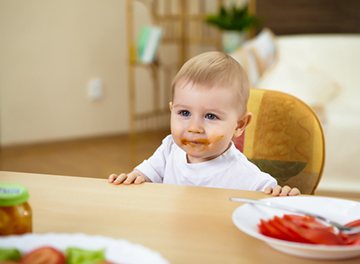
We have already become familiar with the foods that breastfeeding women should not eat.
But there are also products that are blacklisted individually by each mother.
For convenience, you need to keep a special food diary.
It should record absolutely all foods and drinks consumed during the day.
You also need to indicate the exact time of meal. Such records will help you find the product that caused gas formation in your baby. Each product is absorbed from the gastrointestinal tract in approximately 4-5 hours. After this period of time, the active substances pass into the mother’s breast milk.
If there is only one product, it is excluded; when there are several, they carefully look at each one. After a couple of days, introduce them into your diet, only one at a time.
So in a couple of weeks you can figure out what exactly triggered the colic.
In a child under one year old, the intestinal tract is not fully formed, so diarrhea and constipation may occur. Constipation in a 1 month old child - what to do and whether it is necessary to treat?
Read about the importance of gymnastics for newborns in this topic.
Some mothers give their babies sweetened water. This cannot be done, since sugar at such an early age will increase fermentation in the intestines.
Sometimes the mother of a baby is on a very strict diet, so her body may lack vitamins and minerals. In this case, it is recommended to buy a vitamin-mineral complex specifically for nursing mothers. To help the child cope with a problem such as gas formation, the mother needs to reconsider her diet. Exclude from it all products that provoke the problem.
Useful tips for mom
To ensure that such a wonderful fruit as a banana does not bring any trouble to a young mother and baby, you should follow the basic recommendations. They will be as follows:
- In the first month, it is still better to refuse to introduce it into food. You should add it to your diet, starting with half or a quarter, carefully monitoring the baby’s reaction. If the child does not react to the product, you can try doubling the dose. Particular attention should be paid to the appearance of a rash or excessive anxiety of the baby. If they are available, it is better to wait with the innovation for up to 6 - 7 months.
- How many bananas can you include in your diet while breastfeeding? You should eat no more than 1 - 2 pieces per day. Firstly, a larger amount will put a serious strain on a woman’s digestive system. Secondly, it is still a high-calorie product, despite all the benefits. 100 g of fruit contains 85 - 90 kcal.
- If a woman has been diagnosed with gestational diabetes mellitus during pregnancy, bananas should be treated with particular caution due to their high sugar content.
Watch the video about fruits for a nursing mother:

